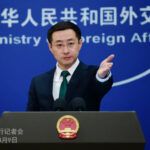Can the Iran deal work without the US?
By Navid Hassibi | October 12, 2017
Media reports say that President Donald Trump may soon inform Congress that Iran is not complying with its end of the nuclear deal, despite numerous IAEA reports to the contrary and his own two previous certifications. The president is reportedly annoyed by the process, which requires him to certify every 90 days that Iran is in compliance with the terms of the agreement, and he appears to be keen to adopt a more confrontational approach toward Tehran.
While Trump’s refusal to re-certify is not the same as completely withdrawing from the deal—formally known as the Joint Comprehensive Plan of Action (JCPOA)—refusing to certify could have a significant impact, kicking the issue over to Congress, which would then have to decide within 60 days whether to re-impose nuclear-related economic sanctions on Iran. While this action is by no means guaranteed, given the discord between the White House and mainstream Republicans on Capitol Hill on a number of issues, the re-imposition of sanctions on Iran is still a distinct possibility, given previous opposition to the deal by dedicated congressional Iran hawks.
And from the Iranian point of view, if sanctions are re-imposed by the US Congress, the United States would be in material breach of the deal, which would give a pretext for its unravelling—unless the deal can in some way survive without the United States.
What are the chances of this happening? Can Washington withdraw from the deal without facts on the ground to back up this action? Can the dispute resolution mechanism contained in the deal save it? What about the role of the other five countries that negotiated with Iran alongside the United States: France, Germany, China, Russia, and the United Kingdom? (And the European Union, which coordinates the JCPOA.)
Can the deal survive?
Immediate signals from Iran and Europe. Recent statements by Iran seem to indicate that it wishes to try to keep the deal going, despite a putative US withdrawal from the JCPOA. Iran’s Foreign Minister, Mohammad Javad Zarif, said in some of his strongest public language yet that Iran would remain in the deal if Europe and others did too. And that seems to be a strong possibility; in an interview with Politico, Zarif said: “The Europeans have made it very clear to us and to the United States that they intend to do their utmost to ensure survival of the deal.” This interview also illuminated what a striking gap Trump has opened up between the Americans and their closest allies.
With this in mind, it is clear that a United States withdrawal from the deal would isolate Washington, significantly damage its credibility to negotiate future agreements in good faith, and harm its relationship with allies.
And it might potentially expose it to economic and even legal risks.
Can Washington even withdraw from the deal? It is unclear whether the Trump administration can simply withdraw from the deal without cause, or as the deal defines it, an issue of non-performance. The deal does not explicitly describe the procedures involved for a party to leave the agreement—likely by design. The United States may consider the deal to be a non-binding political commitment, but the Europeans believe that the JCPOA is binding because it has been codified through a UN Security Council resolution. When viewed through this lens, US re-imposition of unilateral sanctions (including withdrawal from the agreement) could be interpreted as contravening international law and place Washington in legal jeopardy. This course of action would certainly qualify as non-performance under the deal.
To dance around this problem, the Trump administration has repeatedly accused Iran of violating the spirit of the agreement. For example, administration officials have been making references to the JCPOA’s Preamble and its Article 28, both of which state that the parties commit to implement the deal in good faith and refrain from any action inconsistent with the letter, spirit, and intent of the JCPOA. By interpreting these provisions beyond the scope they were originally intended, the Trump Administrations apparently hopes to prop up its possible withdrawal from the deal.
What about the deal’s dispute resolution mechanism? The JCPOA and the corresponding UN Security Council Resolution detail the necessary steps needed to resolve issues of legitimate non-performance. (And it should be noted that this mechanism was developed with the presumption that no party would deliberately sabotage the deal, which seems to be the intent of the Trump Administration’s words and deeds.)
Under this mechanism, both the United States and Iran could raise the issue of non-performance before the Joint Commission, which is charged with overseeing implementation of the deal. The Joint Commission would then have the opportunity to resolve the problem, at both the foreign minister-level and through a three-member advisory panel, each of which could issue a non-binding opinion. In this situation, the three-member panel would consist of Iran, the United States, and a third JCPOA member. (And remember that the Joint Commission consists of the United States, the United Kingdom, France, Russia, China, Germany and Iran.) Seeing as how all the remaining members of the Joint Commission resolutely back continued implementation of the nuclear deal, it’s safe to assume that their judgment would be in favor of Iran and rule that the US was in non-performance—a decision that Washington would disagree with.
But the decision would be a hollow victory for Iran, because the Joint Commission requires full consensus when it comes to the issue of non-performance—effectively meaning unanimous approval—so just the one dissenting vote from the United States would be enough to stop the dispute resolution mechanism from going into effect, and so leave Iran with few options for redress.
But US non-performance might give Iran grounds to cease performing its own commitments in whole or in part. This would see Iran expand its nuclear program to pre-agreement levels and potentially beyond, and remove the transparency and inspection measures that Iran has found so intrusive but which it had agreed to under the deal. As a result, US non-performance could needlessly re-introduce a crisis that had previously been resolved, and increase the risk of military conflict between Iran and the United States (or Israel). Much of the world would likely blame the Trump administration and this would have far-reaching effects; for example, any credible approach to peacefully resolving the situation on the Korean peninsula would be met with skepticism. Or, as EU foreign policy chief Federica Mogherini put it: “We already have one potential nuclear crisis. We definitely [do] not need to go into another one.”
The United States could go even further, by abusing the terms of the JCPOA to re-impose—or “snap back”—UN Security Council sanctions on Iran. The United States would merely have to notify the Security Council of its assessment that Iran is in non-performance, regardless of the facts. The Security Council would then have to vote on a resolution to continue sanctions relief. The Trump administration would likely veto the resolution and the pre-JCPOA UN sanctions against Iran would be back in place.
Ironically, this mechanism was intended to keep Tehran, and not Washington, in check.
To mitigate against a US threat of snapping UN sanctions back, an arcane and mostly symbolic tactic to bypass a veto could be invoked through the so-called “Uniting for Peace” resolution of the UN General Assembly, which allows it to vote on a matter that lacks unanimity in the UN Security Council with a simple majority. Although this may seem far-fetched, it could be a legitimate option in countering President Trump’s unpredictability.
Blowback from US withdrawal? Should Washington contravene the nuclear deal, the remaining members of the Joint Commission could work to salvage what is left of the JCPOA, which, along with the UN Security Council Resolution, allows it to “adopt or modify, as necessary, procedures to govern its activities” and “consult and provide guidance on other implementation matters that may arise under the JCPOA.” In this vein, the Joint Commission could adopt an approach that would include accepting US non-performance and withdrawal as a fait accompli, and encourage its members to simply ignore UN sanctions—effectively preventing any snap back, and working against any unilateral US nuclear-related sanctions on Iran.
The EU has already indicated that it is considering employing a “Blocking Statute” which would make it illegal for EU companies to comply with US sanctions done in this manner. (And there is a precedent for this action; the EU had previously used a Blocking Statute in the 1990s in response to the Clinton administration’s sanctions against Iran.) At a recent panel discussion, the EU ambassador to the United States noted that the “European Union will act to protect the legitimate interests of our companies with all the means at our disposal.”
The trade conducted by such companies is substantial; the EU’s post-sanction trade with Iran increased 55 percent in 2016 from the previous year, and 94 percent in the first half of 2017 from the same time in 2016. And in this vein, EU foreign policy chief Mogherini stated in an interview with Iran’s Tasnim News Agency that the EU wanted to be Iran’s largest trading partner.
Seeking remedial action against US secondary sanctions through the World Trade Organization could be another option by the EU. (Secondary sanctions are penalties applied to third-parties, such as foreign banks not directly linked to Iranian entities.) Presumably, Russia, China and others could adopt similar hedges against US measures.
Consequently, it can be seen that maintaining the deal in some form, without the United States, could indeed be a real possibility.
But by far, the best path forward would be for Washington to continue to comply with the JCPOA—which, after all, was a deal laboriously negotiated in good faith over several years to peacefully resolve a longstanding security concern. Simply put, the alternative to the JCPOA would be escalating tensions and inevitable conflict. Other US grievances against Iran—such as addressing Iran’s ballistic missile program, or countering Iranian influence in the region, or dealing with the sunset clauses of the JCPOA (which see time limits of varying lengths, including 10 and 15 years, on restrictions on Iran’s nuclear program)—should be discussed through engagement and diplomacy.
Should the president fail to re-certify Iranian compliance by the October 15 deadline called for by the agreement, it will be up to members of Congress to act in the best interests of the United States, by refraining to re-impose sanctions.
Together, we make the world safer.
The Bulletin elevates expert voices above the noise. But as an independent nonprofit organization, our operations depend on the support of readers like you. Help us continue to deliver quality journalism that holds leaders accountable. Your support of our work at any level is important. In return, we promise our coverage will be understandable, influential, vigilant, solution-oriented, and fair-minded. Together we can make a difference.
Topics: Analysis, Nuclear Weapons















